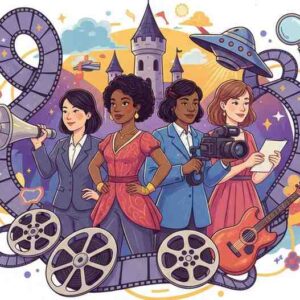India, a land rich in cultural diversity and a thriving democracy, continues to be a beacon for the rest of the world, especially as the global discourse on inclusivity, cultural preservation, and democratic rights gains traction. With a population of over 1.4 billion, India represents the world’s largest democracy, a status it has maintained since its independence in 1947. As the country navigates the complexities of modernization, the interplay between its vast cultural heritage and democratic principles offers valuable lessons on fostering inclusivity, unity, and growth in an increasingly globalized world.
The Role of Cultural Heritage in Shaping Democratic Values
Cultural heritage in India is not only a reflection of ancient customs and traditions but also a living testament to values such as pluralism, tolerance, and coexistence. India’s commitment to democracy is deeply rooted in these cultural values, which emphasize diversity and equality. As of 2024, India recognizes 22 official languages and is home to numerous ethnic groups, religious communities, and cultural practices. This diversity has shaped the democratic framework of India, enshrined in theConstitution of India, which guarantees freedom of expression, religious practice, and equal rights for all citizens.
Recent examples of cultural heritage influencing democratic values include India’s handling of its religious and cultural festivals. Events such as Diwali, Eid, Christmas, and Baisakhi are celebrated across communities, demonstrating the nation’s commitment to religious harmony. In 2023, theMinistry of Cultureannounced that more than 100 cultural festivals were funded and supported through theNational Mission for Cultural Mapping, ensuring the inclusive participation of various communities. This support not only preserves traditional practices but also reinforces democratic values, where every citizen’s cultural identity is respected and cherished.
Democracy and the Preservation of Cultural Heritage
India’s democracy also plays a crucial role in preserving its cultural heritage, providing a framework where diverse traditions are protected by law. The Constitution guarantees cultural and educational rights to minority communities, ensuring that cultural expressions, languages, and traditions are safeguarded. Over the years, India has launched several initiatives to protect its heritage, such as theIntangible Cultural Heritage of Indiaproject, which aims to safeguard traditional practices from being lost to globalization.
Recent actions to preserve heritage include the government’s move to nominate 12 new sites for inclusion in UNESCO’s World Heritage List in 2023, bringing the total number of Indian UNESCO World Heritage Sites to 40. This recognition underscores India’s efforts to protect and promote its cultural identity, while also drawing attention to its democratic commitment to preserving history for future generations.
Furthermore, initiatives like thePRASAD Scheme(Pilgrimage Rejuvenation and Spiritual Augmentation Drive) aim to boost tourism to culturally significant sites while ensuring their sustainable development. These efforts highlight how India’s democratic framework fosters an environment where both cultural preservation and economic growth can go hand-in-hand.
What Can the World Learn?
India’s experience offers vital lessons for other democracies around the world. In nations grappling with cultural diversity, India’s model demonstrates that embracing cultural pluralism is not a challenge but an opportunity to build a stronger democracy. A key takeaway is India’s approach of ensuring that diverse communities, whether based on religion, language, or ethnicity, have a voice in the democratic process. The country’s electoral system, with over 900 million eligible voters as per theElection Commission of India, showcases how inclusivity is integrated into the democratic process.
A recent report by theUnited Nations Educational, Scientific and Cultural Organization (UNESCO)found that countries that promote cultural diversity within democratic frameworks tend to have stronger, more resilient societies. India’s commitment to this idea is evident in its active promotion of cultural festivals, language rights, and support for marginalized communities, ensuring that their voices are heard in the democratic process.
In a world where conflicts over identity and cultural preservation are on the rise, India’s example offers a roadmap for fostering mutual respect and peaceful coexistence. By enshrining cultural rights in its Constitution and through proactive government support, India ensures that democratic participation and cultural heritage go hand in hand.
The Way Forward: Education and Policy Integration
The preservation of cultural heritage and the reinforcement of democratic values are not just about policy but about creating an education system that fosters respect for diversity. In recent years, educational curricula in India have been revamped to include more comprehensive teachings on India’s diverse cultural practices, human rights, and democratic values. TheNational Education Policy 2020emphasizes the importance of inclusive education, aiming to integrate the study of India’s cultural heritage into modern educational frameworks.
As India grows economically and politically, it must continue to find ways to harmonize its democratic values with the preservation of its rich cultural heritage. The ongoing success of theCultural Heritage Preservation Scheme, launched by theMinistry of Culturein 2022, ensures that art forms, local languages, and traditional knowledge systems are not lost to modernization but are instead celebrated and sustained.
Conclusion
India’s unique blend of cultural heritage and democratic values offers profound lessons for the global community. In a world where democracy is often challenged, and cultural identities are under threat, India stands as an example of how a nation can embrace diversity, uphold democratic principles, and ensure that cultural heritage is celebrated. By continuing to protect and promote cultural practices while fostering an inclusive, democratic society, India demonstrates that true democracy does not require uniformity but celebrates the richness of diversity.










